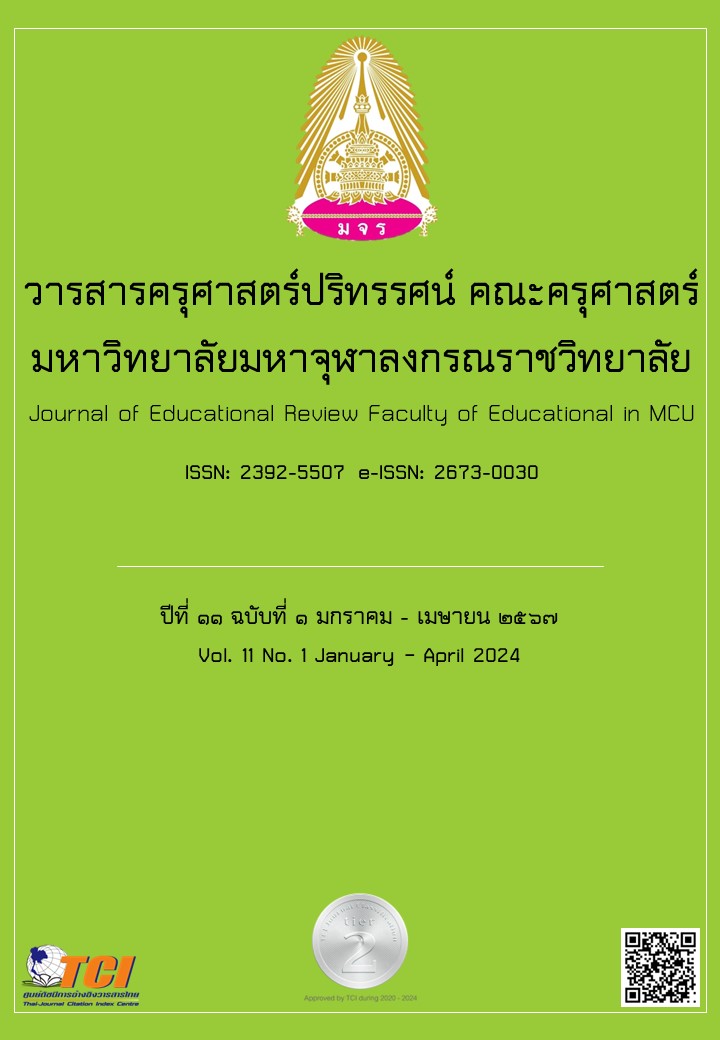PARTICIPATIVE MANAGEMENT OF THE SCHOOL COMMITTEE IN MANAGING LEARNING RESOURCES ACCORDING TO THE PHILOSOPHY OF SUFFICIENCY ECONOMY IN SMALL SCHOOLS UNDER THE SAMUT SONGKHRAM PRIMARY EDUCATIONAL SERVICE AREA OFFICE
Main Article Content
Abstract
The purpose of this research article was to study the participatory management of school committees in managing learning resources according to the philosophy of sufficiency economy in small schools under the Samut Songkhram Primary Educational Service Area Office. It was a combined research method between quantitative research and qualitative research. The research was done in 3 steps: Step 1: Studied the conditions of participation and the need for participation of school committees in managing learning resources according to the philosophy of Sufficiency Economy in small schools by interviewing 34 key informants and using questionnaires for a research sample of 401 people, Step 2: Developed a model for managing the participation of school committees in managing learning resources according to the philosophy of the sufficiency economy in a small school under the Samut Songkhram Primary Educational Service Area Office by organizing a group discussion of 18 experts by selecting them purposively and Step 3: evaluated the model by interviewing 30 key informants and evaluating the model with an evaluation form with a sample of 45 people used in the research, analyzing quantitative data with basic statistics such as percentages, means, and standard deviations, and qualitative data analysis using content analysis. The research results found that participatory management model of the school committee in managing learning resources according to the philosophy of sufficiency economy in small schools under the Samut Songkhram Primary Educational Service Area Office, there were 2 components: Component 1: Participatory management of learning resources by the school committee in managing learning resources in 5 aspects, consisting of 1) Setting policies to promote and support, providing, creating, or developing learning resources in schools. 2) Promoting the development of personnel to have knowledge and experience in organizing learning resources in schools. 3) Supporting personnel in all departments to participate in presenting innovative work created from use of learning resources in schools. 4) Supervision, monitoring, and evaluation of the teaching and learning management system using learning resources in schools. 5) Development of knowledge of the educational institution committee. Component 2: Philosophy of sufficiency economy in schools in 5 aspects, consisting of 1) moderation, 2) reasonableness, 3) good immunity, 4) knowledge conditions, and 5) moral conditions. The results of the evaluation of the model found that the model was feasible and useful at the highest level.
Article Details

This work is licensed under a Creative Commons Attribution-NonCommercial-NoDerivatives 4.0 International License.
ทัศนะและความคิดเห็นที่ปรากฏในบทความในวารสารฉบับนี้ถือเป็นความรับผิดชอบของผู้เขียนบทความนั้นเพียงผู้เดียว และไม่ถือเป็นทัศนะและความรับผิดชอบของกองบรรณาธิการ
กองบรรณาธิการขอสงวนสิทธิ์ในการคัดเลือกบทความลงตีพิมพ์และจะแจ้งให้เจ้าของบทความทราบหลังจากผู้ประเมินบทความตรวจอ่านบทความแล้ว
ต้นฉบับที่ได้รับการตีพิมพ์ในวารสารครุศาสตร์ปริทรรศน์ คณะครุศาสตร์ มหาวิทยาลัยมหาจุฬาลงกรณราชวิทยาลัย ถือเป็นกรรมสิทธิ์ของคณะครุศาสตร์ มหาวิทยาลัยมหาจุฬาลงกรณราชวิทยาลัย ห้ามนำข้อความทั้งหมดหรือบางส่วนไปพิมพ์ซ้ำ เว้นเสียแต่ว่าจะได้รับอนุญาตจากมหาวิทยาลัยฯ เป็นลายลักษณ์อักษร
References
จำรูญ กสิวัตร. (2564). การศึกษารูปแบบการพัฒนาโรงเรียนมัธยมศึกษาโดยใช้หลักปรัชญาของเศรษฐกิจพอเพียงขั้นที่ 3 (นวัตกรรมและมูลค่าสูง) เพื่อพัฒนาท้องถิ่นในประเทศไทย. ดุษฎีนิพนธ์ปรัชญาดุษฎีบัณฑิต. มหาวิทยาลัยบูรพา.
เด่นวิช ชูคันหอม. (2558). รูปแบบการพัฒนาแหล่งเรียนรู้แบบมีส่วนร่วมของชุมชนของสถานศึกษาสังกัดสำนักงานเขตพื้นที่การศึกษาประถมศึกษาขอนแก่น เขต 5. วิทยานิพนธ์ศึกษาศาสตรมหาบัณฑิต. มหาวิทยาลัยมหาสารคาม.
ธนา โด่งพิมาย. (2561). การพัฒนารูปแบบการบริหารจัดการสถานศึกษาโดยบูรณาการหลักปรัชญาของเศรษฐกิจพอเพียงในโรงเรียนประถมศึกษาภาคตะวันออกเฉียงเหนือตอนล่าง. ดุษฎีนิพนธ์ปรัชญาดุษฎีบัณฑิต. มหาวิทยาลัยราชภัฏบุรีรัมย์.
ปาริชาติ สันติเลขวงษ์ และคณะ. (2565). การพัฒนารูปแบบการบริหารสถานศึกษาขั้นพื้นฐานตามหลักปรัชญาของเศรษฐกิจพอเพียง ในภาคตะวันออก. วารสารรัชต์ภาคย์. 16(48). 411-425.
พระราชบัญญัติ แก้ไขเพิ่มเติมคำสั่งหัวหน้าคณะรักษาความสงบแห่งชาติ ที่ 19/2560 เรื่อง การปฏิรูปการศึกษาในภูมิภาคของกระทรวงการศึกษา ลงวันที่ 3 เมษายน พุทธศักราช 2560 พ.ศ. 2565. (2565). ราชกิจจานุเบกษา เล่ม 139 ตอนที่ 39 ก หน้า 14. (8 พ.ย. 2565).
มุทิตา แพทย์ประทุม. (2553). รูปแบบการมีส่วนร่วมของชุมชนกับสถานศึกษาขั้นพื้นฐานเพื่อพัฒนาด้านสิ่งแวดล้อม. ดุษฎีนิพนธ์การศึกษาดุษฎีบัณฑิต. มหาวิทยาลัยบูรพา.
โรงเรียนบ้านแพรกหนามแดง. (2564). แผนปฏิบัติการโรงเรียนบ้านแพรกหนามแดง. สมุทรสงคราม: โรงเรียนบ้านแพรกหนามแดง.
สำนักงานเขตพื้นที่การศึกษาประถมศึกษาสมุทรสงคราม. (2564). แผนปฏิบัติการประจำปี งบประมาณ พ.ศ. 2564. สมุทรสงคราม: สำนักงานเขตพื้นที่การศึกษาประถมศึกษาสมุทรสงคราม.
สำนักงานคณะกรรมการการศึกษาขั้นพื้นฐาน. (2562). คู่มือการดำเนินงานของคณะกรรมการสถานศึกษาขั้นพื้นฐาน สังกัดสำนักงานคณะกรรมการการศึกษาขั้นพื้นฐาน พ.ศ. 2562. กรุงเทพมหานคร: สำนักงานคณะกรรมการการศึกษาขั้นพื้นฐาน.
อรวรรณ แสงสุวรรณ์. (2557). การพัฒนารูปแบบการบริหารแบบมีส่วนร่วมสำหรับระบบประกันคุณภาพการศึกษาสถานศึกษาขั้นพื้นฐาน สังกัดสำนักงานเขตพื้นที่การศึกษาประถมศึกษานนทบุรี เขต 1. ดุษฎีนิพนธ์ปรัชญาดุษฎีบัณฑิต. มหาวิทยาลัยนอร์ทกรุงเทพ.
Krejcie, R.V. & Morgan, D.W. (1970). Determining Sample Size for Research Activities. Educational and Psychological Measurement. 30(3). 607-610.


